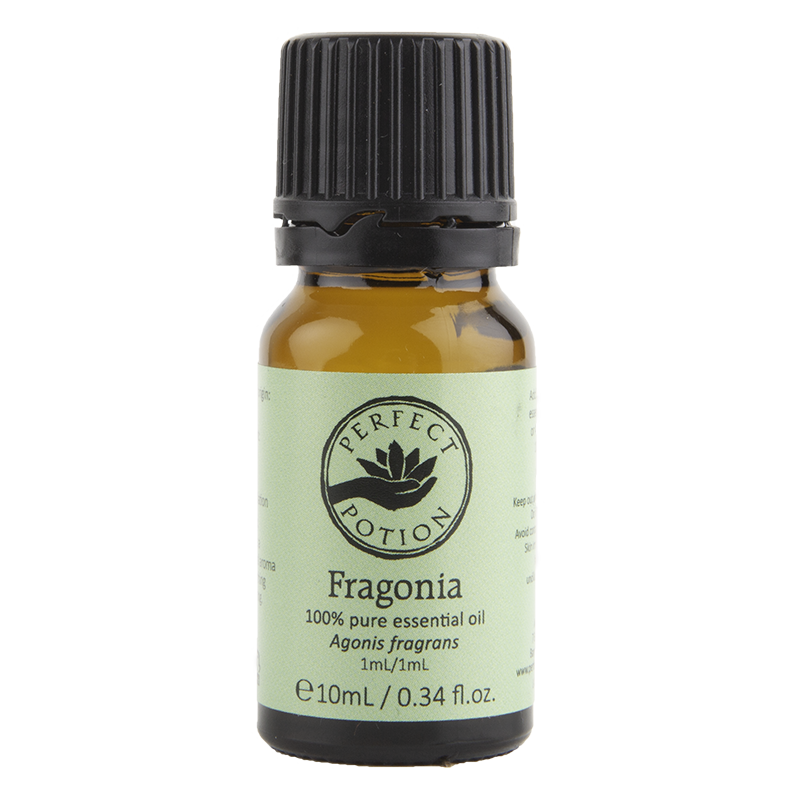The soft delicate camphoraceous scent of fragonia essential oil evokes a sense of calm and harmony. It promotes a space in which we feel physically revitalised, emotional safe and spiritually nurtured.
Botanical name
Agonis fragrans
Synonyms
Course tea tree
Family
Myrtaceae
Botany and origins
Agonis fragrans is a relatively new oil from Australia. It was first introduced to aromatherapists in 2006. It occurs naturally in the southwestern region of Western Australia. It is a small shrub growing up to 2.5 m. It is also referred to as ‘coarse tea-tree’ by the cut-flower industry.1
There is more than one chemotype; however, the Agriculture Department of Western Australia and John Day (grower and distiller) have determined the best chemotype for use. This specific chemotype is now used in aromatherapy and has been trademarked as fragonia essential oil.1
In 2001, The Paperbark Co. established a plantation of A. fragrans that is now producing, promoting and selling increasing quantities of the oil.2 John and Peta Day explain that they chose the name fragonia with great care and think it reflects not only the botanical name,Agonis fragrans, but also its beautiful characteristics and the gentle fragrance of the foliage and oil.3
Method of extraction
Fragonia oil is produced by steam distillation from A. fragrans.
Characteristics
Fragonia oil has a soft, clean, refreshing and delicate camphoraceous aroma with a hint of a citrus note and a sweet balsamic undertone.4
Chemical Composition
The chemical composition of fragonia essential oil is as follows:
α-pinene (21-27%), β-pinene (1.5-1.7%), myrcene (1.4-2.2%), limonene (2.4-2.5%), ɤ-terpinene (1.3-3.3%), p-cymene (2.2-2.9%), 1,8-cineole (29-32.5%), linalool (11.7-12.4%), terpinen-4-ol (3.7-4.3%), α -terpineol (5.4-7.6%), myrtenol (3.1-4.5%), geraniol (0.5-1.2%).1
Pénoël states when we look closely at the chemical profile of fragonia, there are three main constituent molecular groups:
• Monoterpenes – α-pinene, β-pinene, myrcene, limonene, p-cymene and ɤ-terpinene
• Oxides – 1,8-cineole
• Monoterpenols – linalool, terpinen-4-ol, α-terpineol and myrtenol.5
These three main molecular groups are present in A. fragrans in an almost perfect proportional balance of one third each. Pénoël suggests this makes fragonia a truly unique essential oil because of the perfectly balanced ratio of monoterpene hydrocarbons, oxides and monoterpene alcohols. He refers to fragonia as the ‘golden triangle’ – the symbol of balance and harmony.5
This is rare as many essential oils usually have one dominant group of compounds. The balanced chemical composition contributes to the oil’s most pleasant aroma and diverse healing properties.
Historical and Traditional Uses
A. fragrans essential oil is a relatively new oil to the aromatherapy scene. The species itself was only described in 2001 and there is no scientific data on its chemistry and uses prior to this.
Pharmacology and clinical studies
Anti-inflammatory activity
In vitro studies conducted by the School of Paediatrics and Child Health at the University of Western Australia found that fragonia oil inhibited secretion of cytokine interferon (IFN) γ production by mononuclear cells. INFγ and other pro-inflammatory cytokines are involved in the pathogenesis of inflammation, autoimmune disease and atopic dermatitis. This suggests that fragonia oil may be involved in inflammatory response to tissue injury or infection. The authors, however, recommended more studies are required to test this.2
Antimicrobial activity
The antimicrobial activity of fragonia oil was just as effective as tea tree according to research at the University of Western Australia.2
The MIC for fragonia is similar to other well-known antimicrobial oils such as tea tree (Melaleuca alternifolia), lemongrass (Cymbopogon citratus) and oregano (Origanum vulgare).1
Properties
Analgesic, anti-inflammatory, antimicrobial, antiseptic, decongestant, expectorant, immune stimulant1,5,6
Analgesic
Testimonial and case studies have demonstrated the benefits of fragonia oil to relieve pain associated with arthritis, relief of muscular and joint pain within a short time of topical application. Guba states that the p-cymene may contribute to this effect.1
However, Pénöel states there are other essential oils that have a higher percentage of p-cymene but do not have the same analgesic effect as fragonia. Therefore, it is likely that the analgesic action of fragonia is due to the synergistic actions of many constituents.5
Anti-inflammatory
An in vitro study found that fragonia oil inhibited secretion of the interferon involved in the inflammatory response to tissue injury or infection, which suggests that the oil has anti-inflammatory properties.1,6
Expectorant
The 1,8-cineole content makes fragonia oil an excellent expectorant, and the oil is indicated for respiratory conditions with infection and congestion.1
Pénöel has reported great success in treating the respiratory system with fragonia oil. It has been suggested that the monoterpenols provide antimicrobial action upon most common bacteria, while the 1,8-cineole aids the breakup of mucous secretions.5
Immune stimulant
Anecdotal experiences with clients reported by Pénöel suggest that fragonia oil has immune-enhancing properties. Pénöel recommends using it topically to areas of lymph nodes (neck, groin and armpits) or to larger areas of the body, such as the abdomen and back in a ‘perfusion’ treatment.1,4
Infections
Fragonia oil is considered to be an excellent remedy for topical infections such as acne or impetigo, fungal infections such as tinea, and viral infections such as cold sores.1
Psychological
Once you smell fragonia you will understand what Pénöel means when he explains that the oil has a deeply calming influence on our psyche:
The calm feeling that you obtain is different from the effect of taking a synthetic medication ... Its power comes from its capacity to create inner peace and establish harmony from within. We live in a crazy world of constant acceleration and the disease of “more, more, more…” cuts us off from true meaning of life.5
Fragonia induces a profound feeling of calmness and tranquillity and genuine feeling of serenity. Pénöel also explains that fragonia oil induces a far better quality of sleep. He refers to his personal experience using fragonia:
Sometimes we have to go to bed very late because of too much work to finish; the use of fragonia does improve the depth and the relaxing effect of the sleep, so that in the morning there is no feeling of being tired because of too little sleep.5
Guba explains that fragonia oil has a gentle, calming effect on the mind:
The experience of ‘making peace’ seems particularly reserved for those actually dealing with constrained, blocked emotions and in this case, Fragonia does appear to act as a gentle ‘helper’ in loosening these emotional issues for inspection and release.1
Energetics, psyche and subtle uses
Energetics
The energetic qualities of fragonia oil are cooling. It is primarily indicated for conditions of a hotand inflammatory nature.
Personality
According to Myers-Briggs personality types, the fragonia personality is likely to be an INFP. INFPs are gentle, calm, easy going and affirming. Integrity and commitment to what they believe in is essential. They like time alone for their many interests. They like learning and researching new things and interests. They are highly reflective, especially in understanding the mysteries and meaning of life. They have little need to impose their values on others. They prefer to gently influence and inspire. They value authenticity and depth in their relationships.
Subtle
Zeck best describes the energetic qualities of fragonia oil when she states that fragonia is like a candle carrying the light of dignity, nurturing the spirit, and helping you to come to terms and resolve any past traumas and unresolved family issues. Fragonia gently helps remove scars from past emotional pain. She explains that it helps you build resilience and that it carries a unique energy pattern, bringing the gift of the power of love. Fragonia calls you to that place in your higher consciousness where you are connected to something far greater than yourself. It helps you become more resilient, allowing you to celebrate life despite any illness, disease and emotional discomfort.7
Fragonia oil allows us to see with new eyes, experience profound insight, change our perspective and attitude or receive a vision. Fragonia helps us master the third eye chakra. It helps us to keep our mind focused on related issues, including the awareness of the benefits to be gained from transcending the purely physical world and opening ourselves up to intuitive sight and wisdom: the ability to learn from experience and emotional intelligence.7
Blending tips
Fragonia oil’s clean, fresh, delicate, camphoraceous aroma means that it can easily complement most other essential oils. Fragonia oil blends so well with very strong scented oils as well as delicate, light floral oils.
• For the relief of muscular aches and pains consider blending fragonia oil with essential oils such as black pepper, cajeput, peppermint eucalyptus, ginger, kunzea, lavender, manuka, pine or rosemary.
• For the relief of symptoms associated with colds and flu consider blending fragonia oil with essential oils such as cajeput, 1,8-cineole-rich eucalypts, spike lavender, manuka, peppermint, tea tree or thyme CT linalool.
• For the relief of anxiety, nervous tension and stress, consider blending fragonia oil with essential oils such as bergamot, clary sage, geranium, lavender, neroli or sandalwood.
How to use
Bath
Full body bath, foot bath
Topical
Compress, massage, ointment, skin care
Inhalation
Direct inhalation, diffuser, oil vaporiser
Safety
The overall composition of fragonia oil means that it is safe and non-toxic essential oil. It is safe for use on children, the elderly and during pregnancy. It should be well tolerated on the skin and may even be used undiluted.1
References
1. Guba R. A new Australian native – fragonia essential oil. Essential News, Vol. 20, 2008.
2. Robinson C. A new essential oil, Agonis fragrans: chemotype selection and evaluation. Rural Industries Research and Development Corporation, RIRDC Publication No 06/090, Kingston, 2006.
3. Day J, Day P. Fragonia – the oil for the new millennium. Aromatherapy Today, 2006; 36:8-11.
4. Fragonia – an overview, The Paperbark Co, 2008.
5. Pénoël D. Fragonia – the latest promising aromatic gift from Australia. Aromatherapy Today, 2006; 36:12-18.
6. Wallwork K. Fragonia essential oil. Aromatherapy Today, 2006; 36:4-7.
7. Zeck R. The blossoming heart – aromatherapy for healing and transformation. Aroma Tours, East Ivanhoe, 2004.

